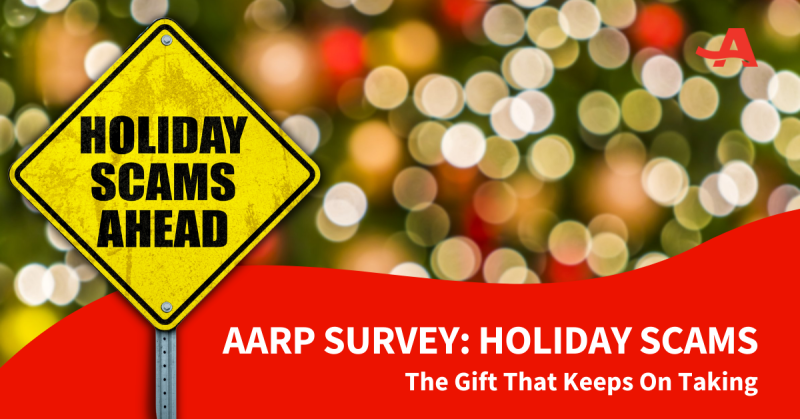AARP Hearing Center

FOR IMMEDIATE RELEASE
November 22, 2021
CONTACT:
Teresa Osborne, tosborne@aarp.org, 717-210-9446
New Survey: Scammers ramp up attacks on consumers as the holiday shopping season begins
Nearly 8,000 people call AARP’s Fraud Watch Network helpline every month to report suspected scams, and a newly released AARP Fraud Watch Network Survey shows that calls related to holiday scams may be on the upswing soon.
“The holiday season is a time for togetherness, celebration, and giving,” said AARP Pennsylvania State Director Bill Johnston-Walsh. “Unfortunately, the gift-giving process, from purchasing the perfect gift to making sure it gets to the recipient, also brings a plethora of opportunities for scammers to enrich themselves.”
Scammers deploy a number of tactics to steal during the holidays, ranging from online shopping scams, to scams involving the draining of gift cards, to package and shipping scams. The AARP study found that many consumers may be opening themselves up to risk as they shop this holiday season.
Here are some key findings from the survey:
- 76% of Pennsylvanians have been targeted by or experienced at least one form of fraud in the past
- 65% of Pennsylvanians will use their debit cards this holiday season (credit cards and digital wallets are safer online)
- 69% of Pennsylvanians plan to purchase gift cards as a holiday gift, and 63% rely on purchasing them off the rack (a known target for scammers)
- 50% intend to use peer-to-peer (P2) apps like Venmo, Zelle or Cash App to send money, and 49% of P2P users have sent money to someone they didn’t know well (not recommended)
- 36% of Pennsylvanians reported receiving a request for a monetary donation to a charity that felt fake or fraudulent
- 31% of Pennsylvanians have received a fake notification about a shipping issue (which is separate from the equally important issue of packages still being stolen from porches)
In addition, the research showed that online shopping, which became the shopping method of choice for many American consumers as a result of the COVID-19 pandemic, remains extremely popular, underscoring the need to know how to do so safely. Unfortunately, survey findings also show that many Pennsylvanians don’t know how to do that, with most respondents failing related questions on a short quiz. For example, only 30% of adults in Pennsylvania know that online retailers will not ask you for your login credentials to provide customer support, and only 39% know that using a credit card vs. a debit card online offers greater protections.
“Ultimately, the point here isn’t to take the joy out of this time of year or take the fun out of gift-giving, but to help consumers be aware so they can protect themselves and their loved ones,” said Johnston-Walsh. “This holiday season, serve your holiday cheer with a side of skepticism to help stay safe from increasingly sophisticated scammers.”
About the AARP Fraud Watch Network:
The AARP Fraud Watch Network launched in 2013 as a free resource for people of all ages. Consumers may sign up for “Watchdog Alert” by email or text that deliver information about scams or call a free helpline at 877-908-3360 to report scams or get help from trained volunteers in the event someone falls victim to scammers’ tactics. The Fraud Watch Network website provides information about fraud and scams, prevention tips from experts, an interactive scam-tracking map and access to AARP’s hit podcast series, The Perfect Scam.
About AARP:
AARP is a nonprofit, nonpartisan social mission organization that helps people ages 50 and over live their best possible lives. AARP does not endorse candidates for public office or make contributions to either political campaigns or candidates. It has staffed offices in all 50 states, the District of Columbia, Puerto Rico, and the U.S. Virgin Islands.































































